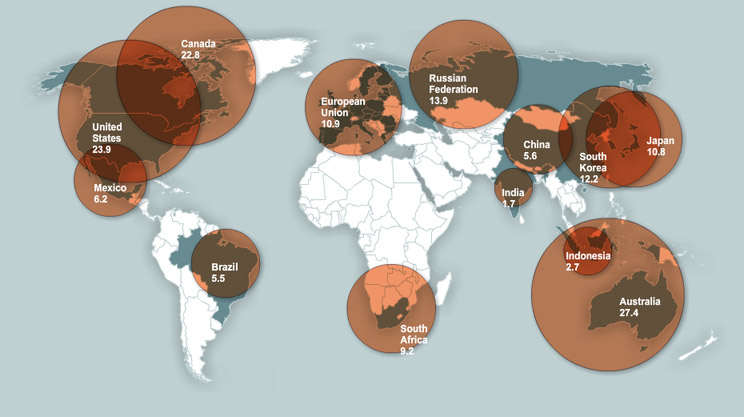 GENEVA (UNEP/IEA/ITF/FIA Foundation), 04 March 2009 - A roadmap towards greater global fuel economy that would halve greenhouse gas emissions from cars must be embarked upon immediately, and integrated into financial support for the car industry, according to a joint international agency report issued today.
GENEVA (UNEP/IEA/ITF/FIA Foundation), 04 March 2009 - A roadmap towards greater global fuel economy that would halve greenhouse gas emissions from cars must be embarked upon immediately, and integrated into financial support for the car industry, according to a joint international agency report issued today.The '50 by 50' Global Fuel Economy Initiative (GFEI) report shows how annual savings of six billion barrels of oil and 2 gigatonnes of CO2 – equivalent to half the total current annual emissions of the EU - are achievable through an ambitious world wide programme.
The report sets out a path to a reduction in fuel consumption per kilometre of 50% by 2050 – with intermediate goals in 2020 and 2030 - in line with suggestions made by the Intergovernmental Panel on Climate Change (IPCC).
It shows that world wide, the car fleet is set to triple by 2050, with serious implications for the global effort to address climate change unless reducing transport emissions and improving fuel economy becomes an urgent global priority.
As a partnership working on the GFEI, the UN Environment Programme (UNEP), International Energy Agency (IEA), International Transport Forum (ITF) and FIA Foundation have set out a radical but achievable agenda, which they will present to a range of key stakeholders at a series of events this year.
With the vehicle industry featuring prominently in recent financial support packages, this initiative gives concrete options for the world to change to cleaner and more efficient cars.
The GFEI will work with governments, the car industry and other stakeholders to achieve this goal, starting at the Geneva Motor Show. The agenda should be achievable just using existing, cost-effective technologies such as better engines and drive trains, more efficient components such as tyres, and lighter materials. Objectives for 2009 include:
- Developing regional assessments and organising launches in Europe, North America, Latin America, and in Asia – towards political engagement with regional groupings and individual countries.
- Starting four national pilot projects in different regions world wide to support countries with the development of national fuel economy policies. Initiatives will also include an interactive toolkit for fuel economy policy development.
- Developing a fuel economy information database, information materials and website (www.50by50campaign.org).
- Engaging with G8 and UN processes.
Speaking at the launch:
Nobuo Tanaka, Executive Director IEA said: "We have to find ways to reconcile legitimate aspirations for mobility, an ambitious reduction in CO2 from cars worldwide, and global economic recovery. In confronting the economic recession this is a real opportunity for governments to combine support for the auto industry with measures to achieve environmental and energy policy goals. The faster we can move on this, the more benefits will accrue."
Achim Steiner, UN Under-Secretary General and UNEP Executive Director said: "The crucial UN climate convention meeting, taking place in some 300 days in Copenhagen must agree a deep, decisive and comprehensive deal to lift the threat of global warming from the lives of billions of people. Transport is a crucial sector in this transformation to a low carbon, green economy. The world's car fleet is expected to triple by 2050 with 80 per cent of this growth in developing economies. Thus an initiative like GEFI has a key role to play. We would urge the world's car and component makers to get on board to prove that they too are part of the solution."
Jack Short, Secretary General ITF said: "The Global Fuel Economy Initiative provides a much needed roadmap for action both now and in the long term. We have set clear targets which will have both environmental and economic benefits, and we already have the technology and the means to get us on the road to making our cars 50% more fuel efficient – all that is needed are coordinated efforts and actions from both industry and governments."
To download an embargoed copy of the report, click - http://www.fiafoundation.org/50by50/Documents/50BY50_report.pdf
Note: This report will be very useful for automotive professionals and environment enthusiasts.






No comments:
Post a Comment